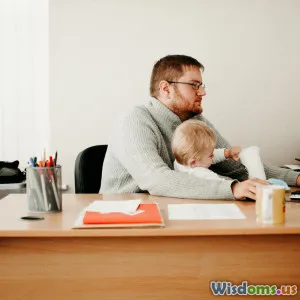
Ten Ways to Help Kids Cope With Their Parents' Separation
8 min read Discover 10 proven ways to support children through their parents' separation with practical advice and empathetic strategies. (0 Reviews)
Ten Ways to Help Kids Cope With Their Parents' Separation
Parental separation is a life-altering event—not just for the adults involved but profoundly for the children who often feel caught in the middle. According to the American Psychological Association, approximately 40-50% of marriages in the United States end in divorce, meaning millions of children face this challenge each year. The impact on children can include feelings of confusion, anxiety, sadness, and even misplaced guilt. However, with the right support, children can emerge from this difficult period resilient and emotionally healthy.
This article explores ten practical and compassion-filled ways to help kids cope effectively when their parents separate. By providing consistent care, honest communication, and ongoing support, parents and caregivers can mitigate the emotional turmoil and promote healing.
1. Foster Open and Age-Appropriate Communication
Children's understanding of separation varies significantly with age. Toddlers might sense tension without grasping its reason, while teenagers often grapple with complex emotions and conflicting loyalties.
Instead of avoiding the topic, parents should initiate honest, straightforward conversations tailored to their child's developmental level. For example, use simple language with younger kids: "Mom and Dad are going to live in different houses, but we both love you very much." Older children may appreciate more detailed discussions about what the change means.
Psychologist Dr. Michelle Bengtson emphasizes, "Parents who communicate openly reduce feelings of confusion and abandonment in children, helping maintain trust even during upheaval."
2. Maintain Consistent Routines
Children thrive on predictability, especially during uncertainty. Maintaining regular schedules around meals, schoolwork, bedtime, and extracurricular activities creates a secure environment amid change.
For instance, a study published in the Journal of Child Psychology and Psychiatry found that children with stable routines during parental separation exhibited fewer behavioral problems and lower anxiety levels. Where routines must adapt (such as splitting time between parents), gradual adjustments and clear explanations can ease transitions.
3. Avoid Placing Children in the Middle
One damaging pitfall is when children feel pressured to choose sides or convey messages between parents. This 'triangulation' can intensify feelings of guilt and divided loyalty.
Parents should consciously keep children out of adult conflicts, ensuring they understand it's not their responsibility to manage disputes. Maria Gomez, a family therapist, notes, "Protecting children from parental conflicts preserves their emotional well-being and prevents undue stress."
4. Provide Emotional Support and Validate Feelings
Children might suppress emotions to comfort parents or avoid burdening them, but recognizing and validating their feelings encourages healthy emotional processing.
Use empathic language: "I can see you're sad about the changes. It's okay to feel upset." Encouraging children to express emotions through talking, drawing, or writing can also be beneficial. Research supports that validated emotional expression correlates with better psychological adjustment.
5. Reassure Children They Are Not to Blame
Many children mistakenly believe they caused the separation. Explicit reassurance is essential to dispel such harmful misconceptions.
Parents can say, "This is an adult decision that has nothing to do with anything you did." Such clarity helps prevent internalized guilt and builds self-esteem.
6. Encourage Ongoing Relationships With Both Parents
Maintaining strong relationships with both parents is crucial for children’s long-term well-being. Whenever safe and feasible, children benefit from frequent, positive interactions with each parent.
Flexible visitation and co-parenting arrangements that prioritize the child's comfort can nurture a secure sense of belonging. The Family Law Review highlights that children involved in amicable co-parenting arrangements have better emotional outcomes compared to those caught in parental conflict.
7. Seek Professional Support When Needed
Sometimes the emotional challenges exceed what parents alone can address. Therapists specializing in family transitions can provide valuable coping tools for children.
Cognitive-behavioral therapy, play therapy, and group counseling have proven effective in helping children navigate feelings of anxiety, anger, and confusion after separation. Early intervention is key to preventing long-term emotional distress.
8. Monitor Behavioral Changes and Mental Health
Changes in a child’s mood, sleep patterns, appetite, or academic performance can indicate struggles with the separation. Parents and educators should monitor these signs and respond with sensitivity.
Studies show that post-separation behavioral problems, if unaddressed, can escalate into depression or conduct issues. Timely recognition and support are vital.
9. Create Stability Through Extended Support Networks
Expanded family and community support provides children with additional security. Grandparents, trusted relatives, teachers, and close family friends can offer consistency and affection that reinforce resilience.
Engaging children in clubs, sports, or community groups encourages social interaction and a sense of normalcy.
10. Emphasize Positivity and Hope for the Future
Despite the upheaval, it is critical to communicate optimism about the child’s future. Stories of families who have successfully adjusted and thrived after separation can inspire hope.
Positioning separation as an opportunity for healthier family dynamics rather than a loss helps children develop a balanced perspective.
Conclusion
Parental separation undeniably challenges children's emotional security, but thoughtful, deliberate support can make a profound difference in their adjustment and resilience. By maintaining open communication, consistent routines, protecting children from conflict, validating emotions, and seeking professional help when needed, parents provide the essential foundation kids need to thrive amid change.
Remember, the goal is not only to help children endure the separation but to equip them with a sense of stability, self-worth, and hope that will serve well throughout their lives. Thoughtful caregiving during these pivotal moments paves the way for healthier relationships in the future—both within the family and beyond.
References:
- American Psychological Association (2019). Divorce and children.
- Journal of Child Psychology and Psychiatry (2018). The impact of consistent routines on children's adjustment.
- Family Law Review (2020). Co-parenting and child well-being post-divorce.
- Interview with Dr. Michelle Bengtson, Licensed Psychologist.
- Interview with Maria Gomez, Family Therapist.
Rate the Post
User Reviews
Popular Posts





















